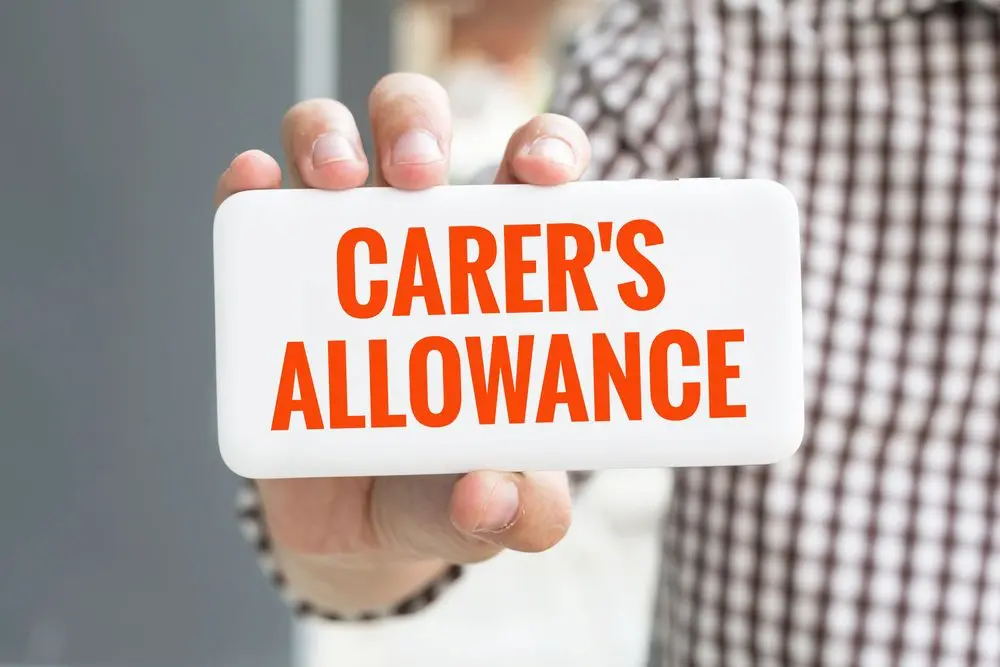What Benefits Can You Claim If You Are a Carer?

Estimated Reading Time: 8 minutes
This article was reviewed by Sara Chapin, Director of Finance at Lottie, on 24th January 2025, to ensure accurate and trustworthy information for care seekers. Sara Chapin has been a Certified Public Accountant with the National Association of State Boards of Accountancy since 2017. Next review due January 2026.
Caring for a loved one can be a rollercoaster of emotions - and is often fulfilling and challenging in equal measure.
When providing unpaid or informal care to someone else, your work life can take a back seat. If your caregiving role is taking over, financial support is available to help you.
As a carer for a family member, there are several state benefits that you may be entitled to. In many cases, these work in a similar way to care home benefits. Our 2024 Care Seeker Survey found that while 59% of people were aware of Carer's Allowance, 20% weren't aware of any benefits they could claim, which is why knowing exactly what's available to you is so important. Read on to learn what each of these benefits is, how they work and how much they pay.
Arrange care at home
Browse the best home care in your area.
In this article on carer benefits:
- Carer’s allowance
- Carer’s credit
- Carer premium
- Disability living allowance for children
- Local welfare assistance
- Universal credit
- Pension credit
- Where to get help and advice about carer benefits
Carer’s Allowance
Carer’s Allowance is the most widely used and spoken about carer benefit. If you’re eligible, then you’ll get £83.30 a week for 2025/26. This also works out as £360.97 a month and £4,331.60 a year. With Carer’s Allowance, you can choose to be paid weekly in advance or every four weeks.
You might be able to claim Carer’s Allowance if you:
- Spend at least 35 hours a week caring for someone
- Are aged 16 or over
- Aren’t in full-time education or studying for 21 hours a week or more
- Earn £196 a week or less (after tax, National Insurance and expenses)
If you earn more than £196 in any given week then it’s important to tell the Department for Work and Pensions. If you don’t, you’ll be asked to pay back the amount you were overpaid. If earnings vary from week to week then you should also let the Department for Work and Pensions know. This way, they can average out your earnings so you stay under the limit.
The person you’re caring for must also be receiving a benefit because of their illness or disability, such as:
- Attendance Allowance at either rate
- Disability Living Allowance at the middle or higher rate of the care component
- Personal Independence Payment (either rate of the daily living component)
- Armed Forces Independence Payment
- Child Disability Payment in Scotland (the middle or higher rate)
- Adult Disability Payment in Scotland (the daily living component)
You can apply for Carer’s Allowance here.

Carer’s Credit
Carer’s Credit is a National Insurance credit that fills up gaps in your National Insurance record.
This will allow you to take on caring responsibilities, without affecting your ability to qualify for the State Pension.
You might be able to get Carer’s Credit if:
- You’re aged 16 or over
- You aren’t yet claiming State Pension
- You don’t qualify for Carer’s Allowance
- You spend at least 20 hours a week caring for someone
- The person you care for gets a benefit because of their illness or disability. This could include Attendance Allowance, Disability Living Allowance, Personal Independence Payment or Armed Forces Independence Payment
You don’t need to apply for Carer’s Credit if you:
- Get Carer’s Allowance (as you’ll automatically get credits)
- Get Child Benefit for a child aged under 12 (as you’ll automatically get credits)
- Are a foster carer
To apply, download the Carer’s Credit claim form.

Carer Premium
To be eligible for a Carer Premium, you must spend at least 35 hours a week caring for someone else. The Carer Premium is received on top of other benefits and amounts to £46.40 a week. If you’re on Universal Credit then this premium is paid monthly at £201.07.
You may be entitled to an additional Carer Premium if you already get:
- Income Support
- The carer element of Universal Credit
- Housing Benefit
- Council Tax Support
- Income-related Jobseeker’s Allowance
- Income-related Employment and Support Allowance
- The carer addition of Pension Credit
Disability Living Allowance For Children
Disability Living Allowance for children can help with the extra costs of looking after a child who:
- Is under 16
- Has difficulty walking or requires much more looking after than a child of the same age who doesn’t have a disability
To claim this, you need to be the parent of the child or look after them as if you’re their parent. It is usually paid every four weeks.
This benefit is made up of two components:
1. Care component
| Care Component | Weekly Rate |
|---|---|
| Lowest | £29.20 |
| Middle | £73.90 |
| Highest | £110.40 |
2. Mobility component
| Mobility Component | Weekly Rate |
|---|---|
| Lower | £29.20 |
| Higher | £77.05 |
So depending on how much help the child needs, the Disability Living Allowance rate can be anywhere between £29.20 and £187.45 (the two higher rates added together).
You can apply by printing off and filling in the DLA claim form, or by phoning the Disability Living Allowance helpline at 0800 121 4600 and asking for a printed form.
If your child lives in Scotland then you should instead apply for Child Disability Payment. If your child moves from Scotland to England or Wales then you need to make a new Disability Living Allowance claim. Child Disability Payment will stop 13 weeks after your child moves - so be sure to apply as soon as possible.
Local Welfare Assistance
If you receive certain benefits or are on a very low income and suddenly need additional money, you might be able to get help in the form of local welfare assistance.
England
Find your local council to see what help they can provide.
Scotland
Learn more about the Scottish Welfare Fund on the mygov.scot website.
Wales
Learn more about the Discretionary Assistance Fund on the Welsh Government website.
Northern Ireland
Learn more about the Social Fund on the nidirect website.
Universal Credit
Universal Credit is a payment to help with living costs. This benefit is paid monthly - or twice a month for some people in Scotland.
You may be eligible if you’re on low income, out of work or unable to work.
For 2025/26, the amount you’ll get for a single household is:
| How Much You'll Get | Monthly Standard Allowance |
|---|---|
| If you're single and under 25 | £316.98 |
| If you're single and 25 or over | £400.14 |
| If you live with a partner and you're both under 25 | £497.55 (for both of you) |
| If you live with a partner and either of you are 25 or over | £628.10 (for both of you) |
Universal Credit is replacing the following benefits:
- Working Tax Credit
- Child Tax Credit
- Income-based Jobseeker’s Allowance
- Income-related Employment and Support Allowance
- Housing Benefit
- Income Support
Apply for Universal Credit here.
Pension Credit
You can claim this benefit once you’ve reached the State Pension age. This is designed to top up your retirement and is separate from the State Pension.
Pension Credit tops up:
- Your weekly income to £227.10 if you’re single
- Your joint weekly income to £346.60 if you have a partner
If you live with a partner, you’ll only be able to claim Pension Credit if you’ve both reached State Pension age.
You could also get an extra £46.40 a week if:
- You get Carer’s Allowance
- You’ve claimed Carer’s Allowance but aren’t being paid because you already get another benefit paying a higher amount
Apply for Pension Credit here.

Where To Get Help And Advice About Carer Benefits
Claiming carer benefits is an often-complicated process, which is why it’s important to make sure you fully understand what you’re entitled to.
For extra benefits advice, along with help filling in claim forms, you can contact the following:
- Carers UK helpline - 0808 808 7777
- Carers Direct helpline - 0300 123 1053
- Age UK - 0800 678 1602
- Citizens Advice - 0800 144 8848
- Gingerbread (for single parents) - 0808 802 0925
- Family Rights Group - 0808 801 0366
Loading the form...



